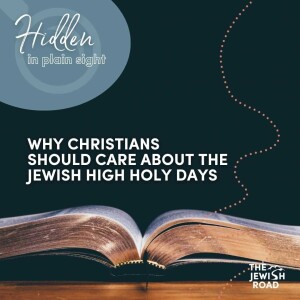
Ever been on a hunt for your glasses just to find them perched on your head? Or searched for your phone while you're actually holding it? Sometimes the things we're looking for are right in front of us, hidden in plain sight. We wrote this guide with our Christian friends in mind for that very reason. You might think that the upcoming Jewish High Holy Days aren't for you, that they're exclusively a 'Jewish thing.' We get it, but hear us out. We're not saying you're wrong for thinking that way, but we do believe you're missing out on something truly transformative. We invite you to take a closer look, to consider the deeper connections, and to broaden your understanding of faith by acknowledging its roots. So stay with us; you might just discover something you never knew you were missing.
The Ten Days of Awe, also known as the High Holy Days, are a significant period in the Jewish calendar. These represent the last three festival days given to Israel in Leviticus 23 in the Hebrew Bible, or what we at The Jewish Road like to call Act One of a two-act play. These festival days are actually called Moedim in Hebrew, or “Appointed Times.” These are God’s appointed times for Israel in which He laid out the course of history for Israel and, in fact, the world as He brings everything to fulfillment in His kingdom.
We should note that there are seven appointed times or festival days given to Israel in Leviticus 23, and they were all prophetic. Four of them have been historically fulfilled, leaving the final three festival days that occur in the fall as prophetic and yet to be fulfilled.
Having said that, the first appointed time on the Fall calendar is in Leviticus 23:23-25, the Feast of Trumpets or Yom Teruah in Hebrew, the Day of Blowing Trumpets. This is the first of the High Holy Days on Israel’s calendar and it is celebrated today as Rosh Hashanah or the Jewish new year. However, if we look at verse 23 we read that this day is a solemn rest and memorial that occurs on the first day of the seventh month, Tishrei. The first month on the Hebrew calendar is Nisan, the time of Passover in the spring. How is this disparity reconciled? Jewish people traditionally began to celebrate this holiday as Rosh Hashanah as the civil new year on Israel’s calendar, beginning during the second Temple period. It is strictly traditional as the new year is in the spring. Interestingly, the Babylonians celebrated their new year at this time and we believe that Israel brought that tradition with them some time after the Babylonian captivity.
The blowing of the shofar or the trumpet was meant to bring Israel’s attention to a time of reflection, repentance, and renewal as we turn our attention to God. It is a time when people take a hard look at their lives and actions over the past year.
Traditionally, this begins what is called the Ten Days of Awe. It's believed that God opens the Book of Life on Rosh Hashanah and seals it on Yom Kippur, deciding the fate of each individual for the upcoming year.
Why is this season important? Well, it's a rare pause, a collective breath for introspection. It’s not just about asking for forgiveness, but also about forgiving others and oneself.
In Jewish tradition, it's a time to set the tone for the year ahead, wipe the slate clean, and start anew. It’s why on the civil calendar, the Jewish community calls this the Jewish New Year. You’ll probably see on your local TV news a Happy New Year wish to “our Jewish friends” and you’ll see a graphic of apples and honey, that your new year may be sweet.
But really, this isn't just a religious exercise; it's a deeply human one, a call from the Creator to not only look back, but also look forward.
No comments yet. Be the first to say something!